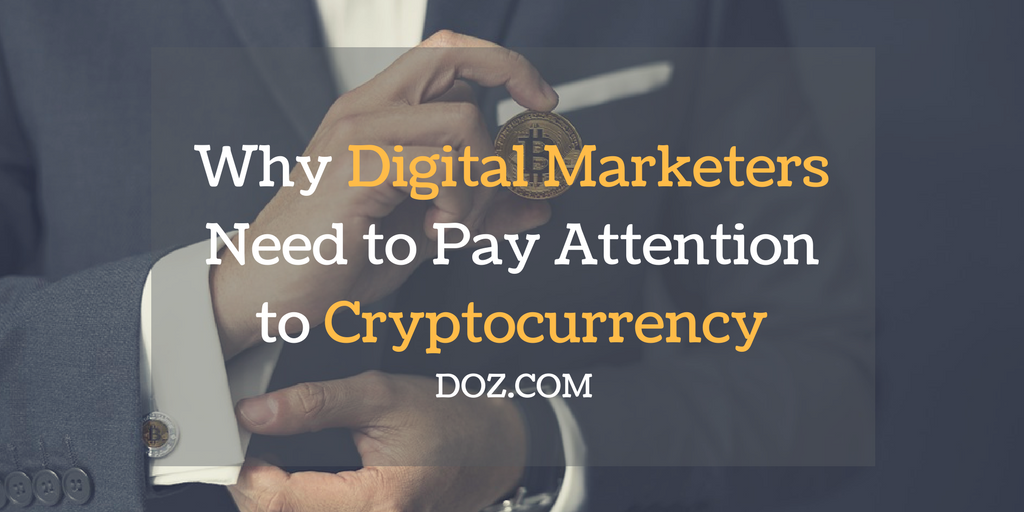
This is an article by Nick Rojas. He combines 20 years of experience working with and consulting for small to medium business and a passion for journalism to help readers grow. He writes about technology, marketing, and social media for the aspiring entrepreneur. When Nick is not sharing his expertise, he can be found spending time at the beach with his dog Presto. You can follow him on Twitter.
Large and small businesses alike are becoming excited about the opportunities that cryptocurrency provides—some of them are even adopting it as a form of payment for goods and services. However, for those in the digital marketing world, cryptocurrencies pose a challenge. Understanding the effect that widespread use of cryptocurrencies stands to have on digital marketing practices will be an essential part of staying ahead of the curve during the next three years, as the user base for tokens such as those who buy bitcoin are expected to multiply by as much as five times.
An End to Convenient Data Mining?
The major problem that cryptocurrencies cause for digital marketing is that they can be used for anonymous purchases. Cryptocurrencies are based on blockchain technology, which uses a decentralized network of multiple devices to verify every transaction conducted. In simple english, that means that transaction records are copied and stored on a large number of random devices each time a transaction occurs. This makes the transaction records extremely difficult to alter fraudulently. One might also assume that it makes transactions easy to trace, but such an assumption would be incorrect. Popular tokens such as Bitcoin do not require users to link their accounts to legal names or home addresses. Moreover, a single user may hold multiple accounts, even for the same kind of cryptocurrency. It’s making a profit with bitcoin easier than other transactions. Through this currency, you can buy with bitcoin on amazon or to any other online store around the globe.

Anonymous transactions are a marketer’s worst nightmare. Here’s why: most digital marketing currently relies on the use of marketing analytics derived from publicly available data. Let’s say you work in marketing for a major retail chain. Basically, your customers agree to let social media applications, search engines and other platforms collect their personal data in exchange for the ability to use them free of charge. Those platforms then sell the data to you and your team, who use it to refine your efforts and target potential customers with similar profiles. By doing so, you spend more of your resources reaching people who are likely to become customers, and your business grows at a faster rate. However, the entire process hinges on knowing who your buyer is. A transaction that can’t be traced back to an individual offers no valuable information to marketers. Even if you were somehow able to develop a profile based on someone’s Bitcoin address, the ability to hold multiple accounts could result in the same individual having vastly different buyer profiles if they used separate accounts for different types of transactions.
Alternative Ways to Gather Information
The advent of cryptocurrency use in everyday transactions doesn’t spell the end of digital marketing, but it may require a creative workaround. One such solution has already been proposed by Alex Zhavoronkov, the CEO of Insilico Medicine. According to Zhavoronkov, consumers will likely begin selling their data voluntarily to digital marketers when cryptocurrency renders traditional data farming methods obsolete. Under this model, marketers would compensate individual buyers for monthly records of their shopping data. The price per consumer would likely be much higher than it is now, but it would also be a great deal more accurate. As such, companies that embrace this model could have access to data that is practically infallible.

As secure online exchanges and other platforms make it increasingly easy to purchase cryptocurrencies, marketers need to prepare for the potential rise in transactions that can’t be analyzed with current tools. The sooner your company is ready to adopt a different model for collecting consumer data, the more you’ll know about your customers when crypto usage becomes commonplace.



16 Comments
You there, this is really good post here. Thanks for taking the time to post such valuable information.
okbet online casino
721878 447955I feel this really is among the most vital info for me. And im glad reading your write-up. But wanna remark on couple of general things, The internet site style is perfect, the articles is truly wonderful : D. Good job, cheers 419754
Members of the volunteers and our society have opened up new plans 토토사이트. You have provided valuable information on your 안전놀이터website to us who are willingly work 메이저사이트. You and our entire community have done something impressive to thank you for 메이저놀이터.
Kompresör sektöründe lider firmayla tanışın. Profesyonel hizmetimizle size en iyisini sunuyoruz.
Sutter Health
I think what you composed was actually very logical.
However, think on this, suppose you composed a catchier
post title? I mean, I don’t wish to tell you how to run your website,
however what if you added a post title that grabbed
folk’s attention? I mean Why Digital Marketers Need to Pay Attention to
Cryptocurrency | DOZ is kinda boring. You should peek at Yahoo’s front page
and watch how they write news headlines to get people to open the links.
You might try adding a video or a pic or two to get readers interested about what you’ve written. Just
my opinion, it might bring your posts a little bit more interesting.
528925 662178I believe other website owners really should take this site as an model, really clean and great user pleasant pattern . 508700
805137 19521You need to join in a tournament very first of the greatest blogs on the internet. I will recommend this internet web site! 188116
This was beautiful Admin. Thank you for your reflections.
Superb post however I was wanting to know if you could write a litte more on this topic? I’d be very grateful if you could elaborate a little bit more.
Also I ve shared your site in my social networks!
I am truly thankful to the owner of this web site who has shared this fantastic piece of writing at at this place.
372840 74387Excellent blog here! Also your site loads up quick! What host are you using? Can I get your affiliate link to your host? I wish my web site loaded up as swiftly as yours lol 725514
276255 140856As soon as I discovered this internet web site I went on reddit to share some with the adore with them. 823034
539202 800204Its like you read my mind! You appear to know so much about this, like you wrote the book in it or something. I believe that you can do with some pics to drive the message home a bit, but rather of that, this is amazing blog. A great read. Ill undoubtedly be back. 982905
611510 446418I discovered your site website on google and check a couple of your early posts. Preserve in the top notch operate. I just extra up your Feed to my MSN News Reader. Searching for toward reading far much more of your stuff afterwards! 557936